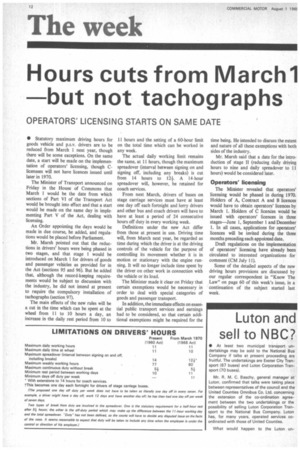Hours cuts from March1 but not tachographs
Page 14

If you've noticed an error in this article please click here to report it so we can fix it.
OPERATORS LICENSING STARTS ON SAME DATE
• Statutory maximum driving hours for goods vehicle and p.s.v. drivers are to be reduced from March 1 next year, though there will be some exceptions. On the same date, a start will be made on the implementation of operators' licensing, though Clicensees will not have licences issued until later in 1970.
The Minister of Transport announced on Friday in the House of Commons that March I would be the date from which sections of Part VI of the Transport Act would be brought into effect and that a start would be made on the same day in implementing Part V of the Act, dealing with licensing.
An Order appointing the days would be made in due course, he added, and regulations would be placed before Parliament.
Mr. Marsh pointed out that the reductions in drivers' hours were being phased in two stages, and that stage I would be introduced on March I for drivers of goods and passenger vehicles as provided for in the Act (sections 95 and 96). But he added that, although the record-keeping requirements would be subject to discussion with the industry, he did not intend at present to require the compulsory installation of tachographs (section 97).
The main effects of the new rules will be a cut in the time which can be spent at the wheel from 11 to 10 hours a day, an increase in the daily rest period from 10 to 11 hours and the setting of a 60-hour limit on the total time which can be worked in any week.
The actual daily working limit remains the same, at 11 hours, though the maximum spreadover (interval between signing on and signing off, including any breaks) is cut from 14 hours to 124. A I4-hour spreadover will, however, be retained for coach services.
From next March, drivers of buses on stage carriage services must have at least one day off each fortnight and lorry drivers and other bus and coach drivers will have to have at least a period of 24 consecutive hours off duty in every working week.
Definitions under the new Act differ from those at present in use. Driving time will, from March next year, be regarded as time during which the driver is at the driving controls of the vehicle for the purpose of controlling its movement whether it is in motion or stationary with the engine running. It will no longer include time spent by the driver on other work in connection with the vehicle or its load.
The Minister made it clear on Friday that certain exemptions would be necessary in order to deal with special categories of goods and passenger transport.
In addition, the immediate effects on essential public transport services and earnings had to be considered, so that certain additional exemptions might be required for the time being. He intended to discuss the extent and nature of all these exemptions with both sides of the industry.
Mr. Marsh said that a date for the introduction of stage II (reducing daily driving hours to nine and daily spreadover to 11 hours) would be considered later.
Operators' licensing The Minister revealed that operators' licensing would be phased in during 1970. Holders of A, Contract A and B licences would have to obtain operators' licences by March 1. Holders of C licences would be issued with operators' licences in three stages—June 1, September 1 and December 1. In all cases, applications for operators' licences will be invited during the three months preceding each appointed date.
Draft regulations on the implementation of operators' licensing have already been circulated to interested organizations for comment (CM July 11).
Some of the detailed aspects of the new driving hours provisions are discussed by our regular correspondent in "Know The Law" on page 60 of this week's issue, in a continuation of the subject started last week.


































































































